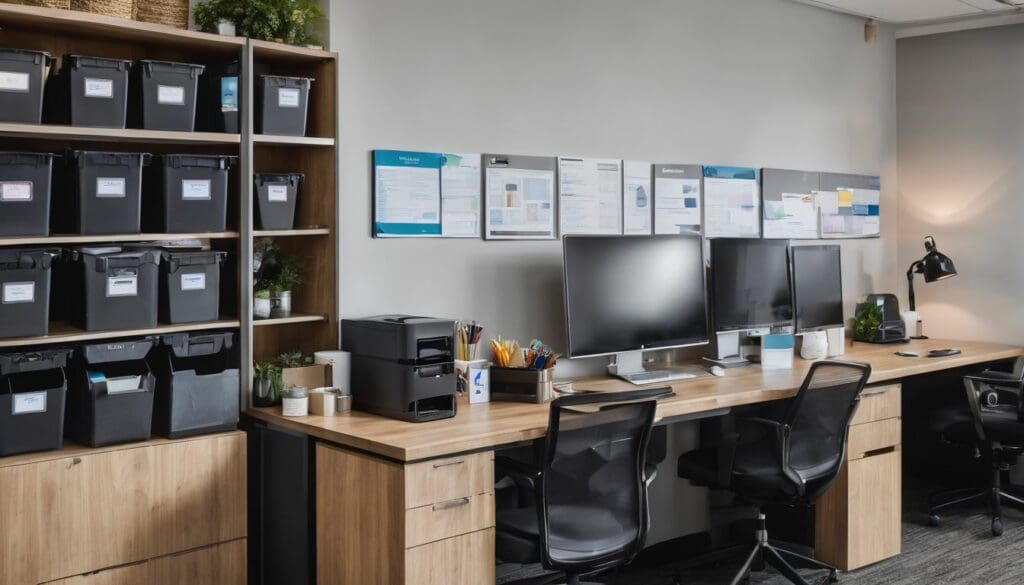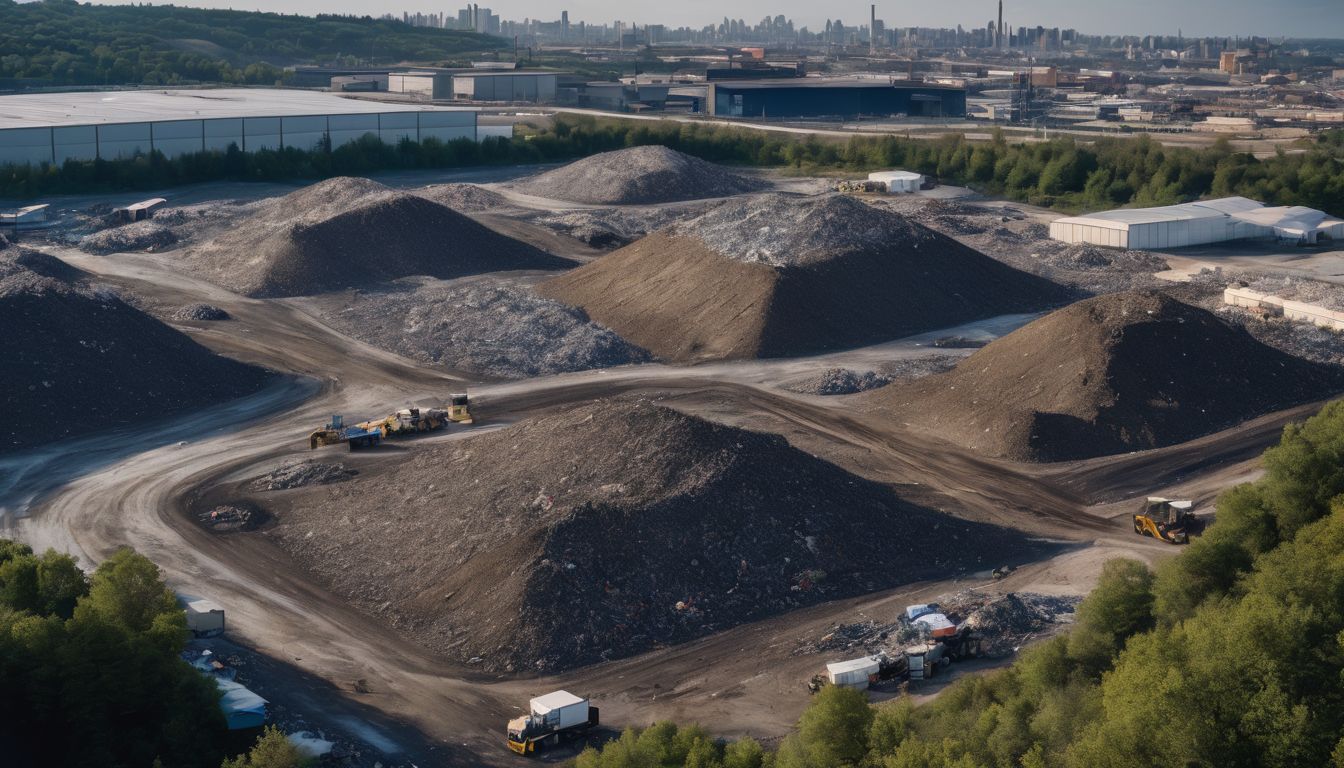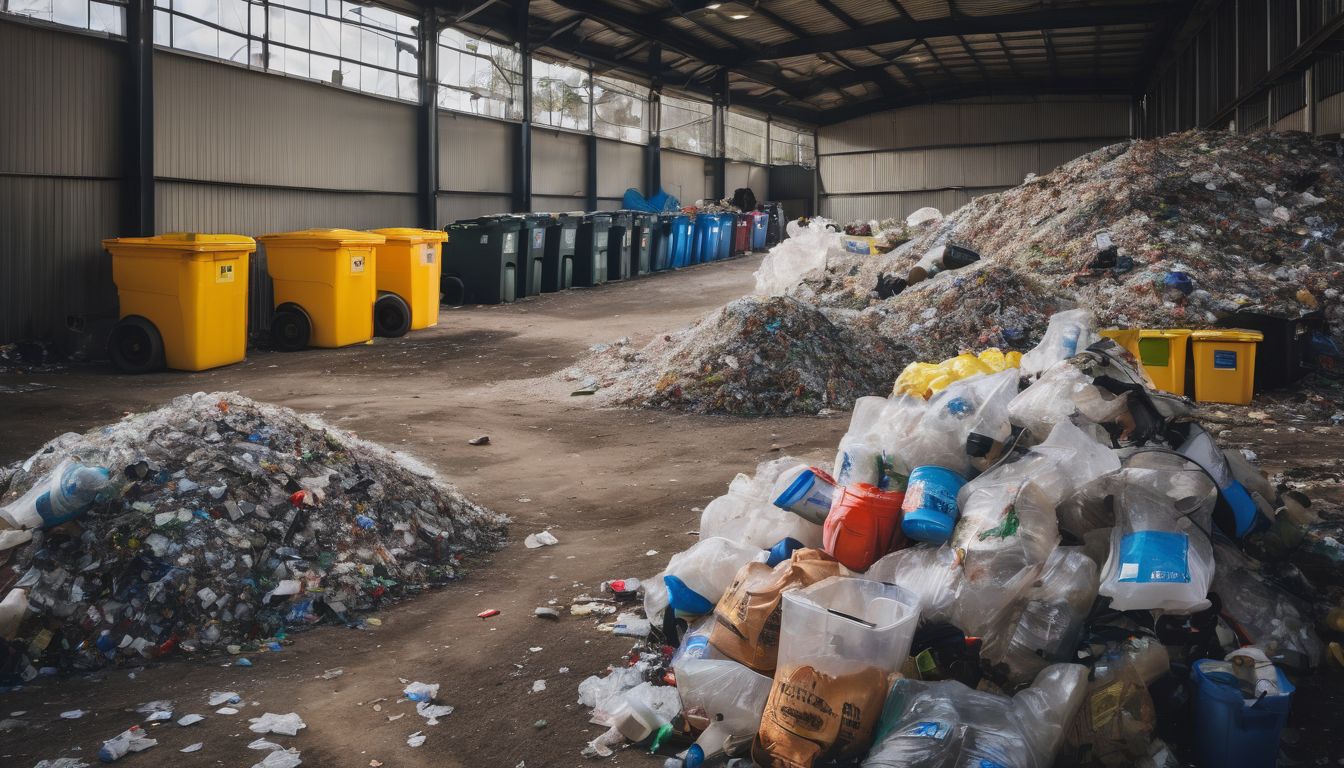Many offices struggle to manage their waste effectively. Recycling in the workplace can cut down on both costs and environmental impact. This article offers practical tips for setting up a successful recycling programme that’s easy to follow.
Let’s make your office greener, starting today!
Key Takeaways
- Introduce clear recycling guides like “how-to” posters and properly labelled bins throughout the office to increase awareness and make sorting easier.
- Offer rewards and set achievable recycling goals to motivate employees towards sustainable practices.
- Regularly train staff on correct recycling procedures, including what items can be recycled and how to avoid contamination.
- Use eco – friendly materials such as recycled paper in the office and discourage unnecessary printing to conserve resources.
- Establish a structured system for collecting recyclables with designated teams or individuals responsible for their proper disposal.
Why Recycling in the Workplace is Important
Recycling in the workplace is important as it reduces waste, conserves resources, cuts costs, and benefits the environment. These efforts contribute to a more sustainable and eco-friendly workplace.
Reduces waste
Recycling in the workplace slashes the amount of rubbish sent to landfills and incinerators. It turns materials that would otherwise become waste into valuable resources, thus creating a circular economy within the office environment.
Implementing an effective office recycling program ensures that paper, plastics, metals, and other materials are reprocessed and reused instead of taking up space in the earth.
By cutting down on waste, businesses demonstrate environmental responsibility and contribute to sustainability goals. Simple actions like using fewer raw materials help conserve natural reserves.
An eco-friendly workplace not only reduces its carbon footprint but also sets a positive example for employees, stakeholders, and the community. Sustainable business practices are vital in protecting our planet for future generations.
Conserves resources
Recycling in the workplace conserves resources by reducing the need for raw materials. It helps to minimise energy consumption and lessen air and water pollution. By reusing materials, you can reduce the demand for fresh resources like water, timber, and minerals used in manufacturing processes.
Effective recycling also lessens the amount of waste sent to landfills, decreasing harmful emissions that contribute to air and soil pollution. This approach complements workplace sustainability efforts by curbing resource exploitation while promoting a more eco-friendly office environment.
Cuts costs
Implementing a comprehensive recycling programme in the workplace can effectively cut costs. By reducing waste and reusing materials, businesses can save money on disposal fees and purchasing new resources.
This practice demonstrates corporate responsibility and contributes to environmental sustainability while positively impacting the company’s bottom line.
Recycling is an essential aspect of office operations that promotes resource conservation and benefits the environment. Businesses that prioritise waste reduction contribute to sustainable office practices, thus encouraging eco-friendly workplace solutions and demonstrating environmental initiatives for businesses.
Benefits the environment
Cutting costs in the workplace by implementing recycling initiatives also benefits the environment. Conserving resources through recycling reduces the demand for raw materials and energy, leading to a reduction in air and water pollution.
Additionally, reducing waste in landfills helps prevent harmful chemicals from leaching into the soil, ensuring a healthier ecosystem for future generations.
Encouraging an eco-friendly workplace through recycling not only saves money but also plays a vital role in promoting environmental responsibility within the corporate setting. By engaging in efficient waste management practices and incorporating green initiatives such as using recycled paper or encouraging proper recycling procedures, businesses can significantly contribute to creating a more sustainable and environmentally friendly workspace.
Encouraging Participation in the Workplace
Spread the word about the importance of recycling, post “how-to” posters, use clear labels, provide incentives and set an office goal to encourage participation in workplace recycling.
Read more for further tips on improving your office’s recycling efforts.
Spread the word
Encourage a culture of recycling by spreading awareness about the benefits of waste reduction and resource conservation. Share information about the positive impacts of workplace recycling through company newsletters, social media platforms, and staff meetings.
Promote eco-friendly practices to create an environmentally responsible work environment that supports corporate sustainability initiatives.
Raise awareness about office recycling tips and incentives to inspire colleagues to participate in green workplace solutions. Utilise various communication channels to inform employees about corporate recycling strategies, empowering them to contribute towards waste management in the office.
Post “how-to” posters
Displaying clear and easy-to-follow recycling guidelines through eye-catching posters is an effective way to encourage participation in workplace recycling initiatives. By placing posters in prominent areas, employees can easily understand what materials are recyclable and how to properly sort them.
These visual aids serve as constant reminders and help create a culture of responsibility towards environmental conservation within the workplace.
Additionally, using vibrant visuals and simple language on the posters will ensure that the information is accessible to everyone, making it easier for employees to get involved in corporate recycling efforts.
Use clear labels
Clearly label all recycling bins with the appropriate materials that can be placed inside. Use easily recognisable symbols and colour-coding to indicate where paper, plastic, glass, and other recyclables should go.
Ensure that everyone in the workplace can understand which items belong in each container.
For special collections such as batteries or electronics, clearly display a separate bin with a specific label for these items. This will help prevent contamination of regular recyclables and make it easier for employees to dispose of these items properly.
Provide incentives
To encourage recycling in the workplace, offering incentives can be an effective strategy. Rewards such as gift cards, extra time off, or recognition can motivate employees to participate actively.
Offering small rewards for meeting recycling targets and participating in eco-friendly initiatives can generate enthusiasm and commitment towards sustainable practices within the workplace environment.
In addition to individual incentives, team-based rewards, like pizza parties or group outings, can foster a sense of collective responsibility while making recycling efforts more enjoyable.
Set an office goal
Encourage your office to aim for a specific recycling target. By setting a clear goal, everyone will feel motivated to work towards the same objective. This could be increasing the amount of paper, plastic, or glass recycled each month.
Setting achievable targets creates friendly competition and fosters a sense of achievement when goals are met. When employees unite under a common purpose, they become more conscious of their daily waste and actively seek ways to reduce it.
You can also hold regular progress updates to maintain momentum towards the set goal. Encouraging participation through rewards for departments that exceed their objectives can further drive commitment and engagement with recycling initiatives in the workplace.
Organizing Recycling in the Workplace
Train new employees on the importance of recycling and how to properly sort and dispose of materials in the workplace. To learn more about best practices for recycling in the workplace, continue reading!
Train new employees
New employees should undergo comprehensive recycling training sessions as part of their onboarding process. This training will familiarise them with the company’s recycling programme and educate them about the importance of eco-friendly practices in the workplace.
During these sessions, they will learn how to correctly sort recyclables and dispose of waste, ensuring that they actively contribute to the corporate recycling programme.
Introducing new employees to proper recycling practices from the outset fosters a culture of environmental responsibility within the workplace, aligning with the company’s eco-friendly objectives.
Install separate recycling bins
Place separate recycling bins throughout the workplace, making it easy for employees to recycle paper, plastic, glass, and other materials. Label the bins clearly so that everyone knows what can be recycled in each container.
By implementing separate recycling bins, you can significantly increase the amount of waste diverted from landfills and promote a culture of sustainability in the office.
Encourage your colleagues to use these separate recycling bins regularly. Make sure they understand the importance of proper sorting to prevent contamination. Position the containers in high-traffic areas to ensure visibility and accessibility for all.
Connect with special collectors
Collaborate with specialist recyclers in your area to handle specific materials. Recyclable items such as electronic waste, batteries, and ink cartridges can often be collected by specialised recycling companies or organisations.
By building a relationship with these collectors, you ensure that a broader range of items can be recycled responsibly rather than ending up in landfill sites.
Additionally, encourage the workplace to consider composting organic materials like food waste and coffee grounds. Establish partnerships with local compost facilities or community gardens where this waste can be put to good use instead of contributing to methane emissions in landfills.
Hold occasional training sessions
Hold regular training sessions to educate employees on the importance of recycling and correct sorting practices. Use these sessions to highlight the benefits of recycling in the workplace, providing practical examples and success stories that demonstrate its positive impact.
Encourage open discussions and feedback, allowing employees to share their own ideas for improving recycling initiatives within the office.
By educating and engaging your team through regular training sessions, you can create a culture of sustainability in the workplace. This will not only increase participation but also foster a sense of collective responsibility towards creating an eco-friendly environment.
Tips for Improving Recycling in the Workplace
Encourage the use of recycled paper and double-sided printing to reduce paper waste. Educate employees on proper recycling practices to ensure that items are disposed of correctly and efficiently.
Use recycled paper and print on both sides
Opt for recycled paper and print on both sides to lessen the environmental impact of office printing. This efficient practice conserves resources while reducing waste. By choosing recycled paper and utilising both sides, you contribute to a more sustainable workplace, aligning with eco-friendly practices.
Printing on recycled paper saves trees and energy, benefiting the environment by decreasing deforestation and carbon emissions. Encouraging this activity in the workplace supports an eco-conscious culture, promoting sustainable choices that make a positive difference in the larger conservation effort.
Discourage unnecessary printing
To promote a more eco-friendly workplace, discourage unnecessary printing. Encourage employees to use digital documents instead of paper copies whenever possible. Set up default printer settings to print double-sided and in black and white to reduce ink consumption.
Provide clear guidelines on when printing is necessary and encourage the use of electronic filing systems to minimise the need for hard copies.
Educate staff about the environmental impact of excessive printing, highlighting how it contributes to waste and carbon emissions. Implement a system where employees must justify their need for printed documents, emphasising the importance of thoughtful resource usage.
Educate employees on proper recycling practices
To promote eco-friendly practices in the workplace, educate employees on proper recycling practices. Offer training sessions to inform staff about what can and cannot be recycled. Create clear guidelines and provide examples of how to recycle common office items such as paper, plastic, and cardboard.
Emphasise the importance of rinsing out containers before placing them in the recycling bins and encourage using reusable coffee cups and water bottles. Clearly label recycling bins throughout the office to make it easier for employees to separate their recyclables from general waste.
Encourage a culture of responsibility by regularly reminding employees about proper recycling practices through internal communication channels such as emails, newsletters, or notice boards.
Create a recycling hauler system
To effectively implement recycling practices in the workplace, it is essential to create a recycling hauler system. This involves designating specific employees or teams responsible for collecting and transporting recyclable materials to the designated collection points or collectors.
By establishing a structured hauler system, businesses can ensure that recyclables are properly managed and disposed of, contributing to an eco-friendly workplace environment. Additionally, this proactive approach helps streamline the recycling process, making it easier for employees to participate and support conservation efforts within the organisation.
Implementing a recycling hauler system not only simplifies the process but also promotes accountability among employees when it comes to waste management. It encourages active participation in sustainable practices while creating an efficient workflow for managing recyclables within the workplace.
Conclusion
In conclusion, implementing effective recycling practices in the workplace can significantly reduce waste and benefit the environment. Encouraging participation through clear communication and incentives fosters a more eco-friendly workplace.
By organising recycling efforts and adopting simple tips, companies can play a pivotal role in conserving resources for future generations.
FAQs
1. What are the best practices for recycling in the workplace?
Best practices for recycling in the workplace include setting up clear and accessible recycling programs, educating staff about eco-friendly practices, and providing incentives to encourage participation.
2. How can we create an eco-friendly workplace through recycling?
Creating an eco-friendly workplace involves implementing a robust recycling program, encouraging the use of recyclable materials, and promoting awareness on how to reduce waste effectively.
3. What kind of incentives work well to promote recycling at work?
To promote recycling at work, consider offering rewards such as extra break times or small bonuses for teams that recycle consistently or come up with innovative ways to improve your company’s environmental impact.
4. Why is it important to have a good workplace recycling program?
Having a good workplace recycling program significantly reduces waste sent to landfills, conserves natural resources, saves energy, supports environmental sustainability efforts and fosters a culture of responsibility among employees.





